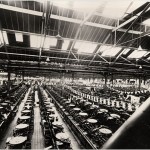Apple Using Cash to Secure Cache of Components
 Asked last October about Apple’s plans for the nearly $60 billion in cash it had on hand, CEO Steve Jobs suggested the company intended to allocate some to future big-ticket purchases.
Asked last October about Apple’s plans for the nearly $60 billion in cash it had on hand, CEO Steve Jobs suggested the company intended to allocate some to future big-ticket purchases.
“We strongly believe that one or more very strategic opportunities may come along, that we are in a unique position to take advantage of because of our strong cash position,” he said. “You know, we’ve demonstrated a strong track record of being very disciplined with the use of our cash. We don’t let it burn a hole in our pocket, we don’t allow it to motivate us to do stupid acquisitions. And so I think that we’d like to continue to keep our powder dry, because we do feel that there are one or more strategic opportunities in the future. That’s the biggest reason.”
That remark spurred all sorts of speculation about what sensible large-scale acquisitions Apple might make. And while it was certainly reasonable to conclude from Jobs’s remarks that Apple is preparing itself for some big M&A plays in the future, there was another equally plausible conclusion: What if by “strategic opportunities,” Jobs was referring to supply chain investments–money spent to overcome impediments to growth? Apple has done this before, most notably in 2005, when it arranged to purchase up to 40 percent of Samsung Electronics’ holiday NAND flash output for use in it iPods. It inked a similar iPhone-related deal in 2008, forcing Samsung to reduce its supply to other customers to fulfill its obligation to Apple. And there was another half-billion-dollar deal with Toshiba is 2009.
And according to COO Tim Cook, Apple just did it again–but on a much grander scale. During the first-quarter earnings call last week, Cook said the company had invested $3.9 billion to secure component supplies and capacity.
“We’ve historically entered into certain agreements with different people to secure supply and other benefits,” he said. “And the largest one in the recent past has been we signed a deal with several flash suppliers back at the end of 2005 that totaled over $1 billion because we anticipated that flash would become increasingly important across our entire product line and increasingly important to the industry. And so we wanted to secure supply for the company, and we think that, that was an absolutely fantastic use of Apple’s cash. And we constantly look for more of these. And so in the past several quarters we’ve identified another area and come to some recent agreements that [CFO Peter Oppenheimer] talked about in his opening comments, in that these payments consist of prepayments and capital for process equipment and tooling. And similar to the flash agreements, they’re focused in that area we feel is very strategic. And so I’d prefer not to go into more detail about what specific area it’s in, but it’s the same kind of thinking that led us to those deals that led us to the flash deal.”
For what particular components, he wouldn’t say. There are some likely candidates, though: The high-res LCDs used in the iPhone 4 and iPad; solid-state drives like the ones in the new MacBook Air, which are presumably headed to other portions of the MacBook line as well; or perhaps some new system on a chip that will infuse the next-generation iPad and iPhone with significant performance gains. I’m sure there are others as well. And all fit quite nicely into Jobs’s vision of “strategic opportunities.”









